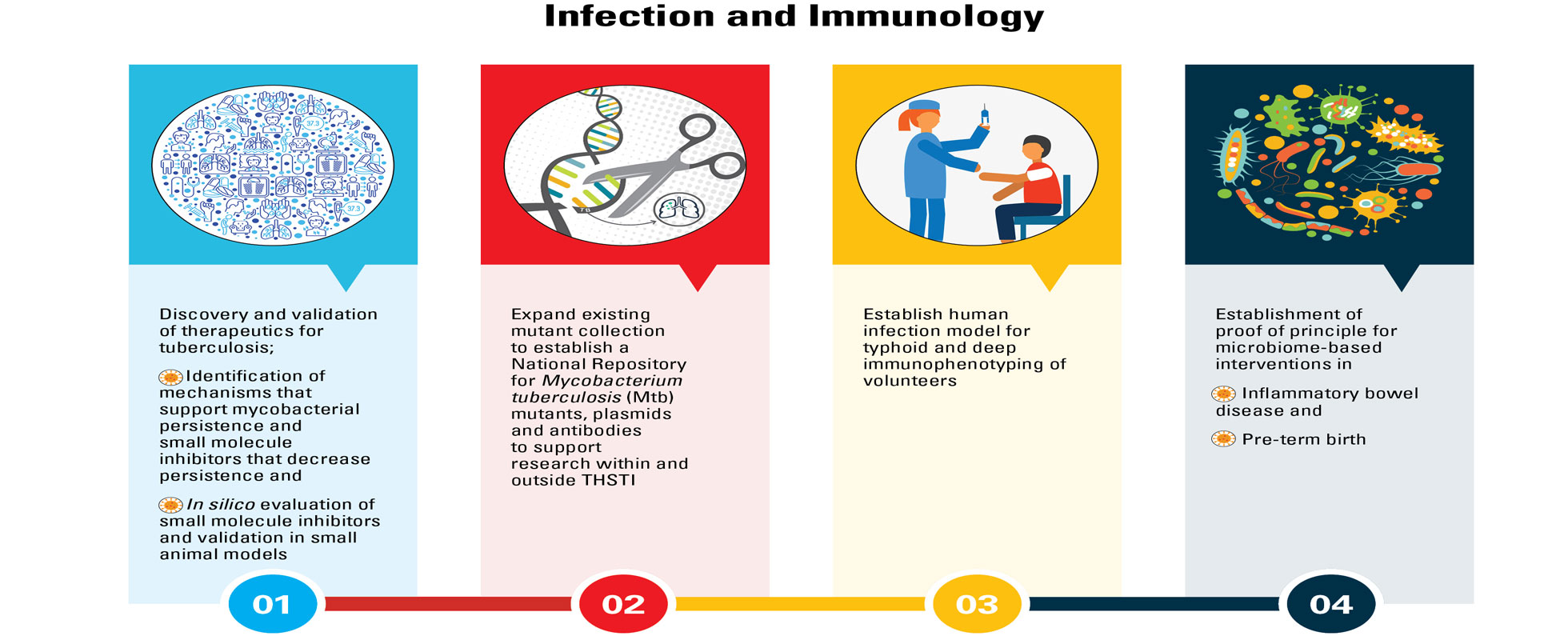Tuberculosis
Tuberculosis (TB), caused by Mycobacterium tuberculosis (Mtb), is an old enemy of public health and continues to be an enormous health burden in developing countries. The World Health Organization (WHO) estimated TB to have caused 1.6 million deaths among HIV-negative and HIV-positive people taken together. The same report also gave the global best estimate of number of people who developed TB in 2017 to be 10 million. The Govt. of India targets to eliminate TB by 2025 which, in turn, calls for intensified research and interventions to contain the infection and spread of TB while also developing innovations in TB vaccination and therapeutics.
In view of this, the TB research program at THSTI is designed with the following objectives.
- Understanding TB pathogenesis
- Delineating emergence of the persisters
- Identification of drug targets and
- Development of novel vaccines against TB
Virology
Flaviviruses are globally emerging and cause significant human disease in the form of encephalitis or haemorrhagic fever. The medically important flaviviruses are dengue, zika virus, yellow fever, Japanese encephalitis, St. Louis encephalitis, tick‐borne encephalitis and West Nile viruses. Flaviviruses account for approximately 400 million infections annually, with billions at risk and no specific therapy available. In humans, the majority of WNV and DENV infections are subclinical, with severe illness occurring in only a subset of individuals. Disease diagnosis can be difficult as all flaviviruses are antigenically and genetically closely related. There are no effective antiviral therapies that exist for any flavivirus so the main approach to disease control is through vaccination and vector control. Currently focus is on:
- Identifying host factors that associate with severe dengue disease and play a role in dengue virus life-cycle.
- Generation of sufficient knowledge/resources for in depth molecular understanding of the HEV lifecycle.
- Understanding tropism of dengue virus in specific cell types found in bone marrow.
Antimicrobial resistance in bacteria
Antimicrobial Resistance (AMR) has become a global threat, and the situation is particularly alarming in developing countries like India. It has crippled advancements in the treatment of infectious diseases, organ transplantation, cancer chemotherapy, and major surgeries further resulting in increased healthcare costs, prolonged illness, disability, and death. Although, prevalence of AMR genes among pathogenic bacteria is widely studied for the interest of infectious disease management, the resistance profile and the genetic traits that encode resistance in the commensal microbiota living in the gut of healthy humans are not well studied.
- Current focus is on understanding the mechanisms that connect the human gut microbiota to the efficacy and toxicity of xenobiotics, including antimicrobial drugs and how gut microbiota contribute in the dissemination of AMR traits in enteric pathogens.
Acquired Immunodeficiency Syndrome
The HIV Vaccine Translational Research (HVTR) laboratory carries out early translational research and development under the joint partnership program between THSTI and the International AIDS Vaccine Initiative (IAVI) that follows the principles of a center of excellence with unique strengths towards accelerating the efforts towards development of broadly neutralizing antibodies (bnAbs) to HIV-1, and characterizing antigenic properties of HIV-1 envelope proteins (Env) for their suitability in informing immunogen design and antibody isolation.


